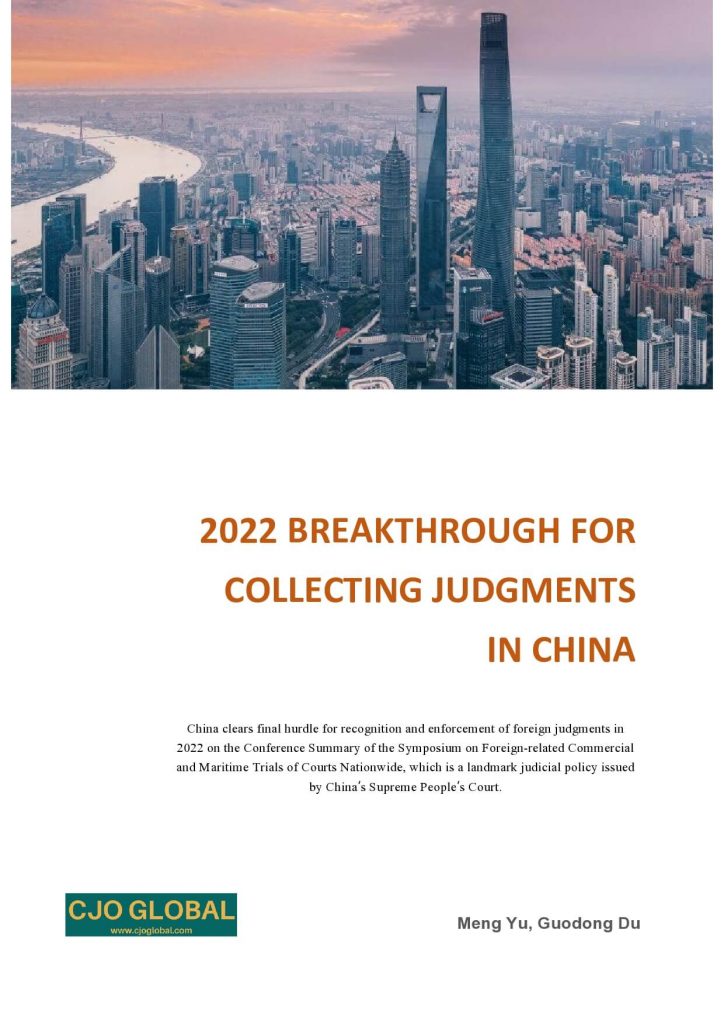How Chinese Courts Determine Reciprocity in Foreign Judgment Enforcement – Breakthrough for Collecting Judgments in China Series (III)
Key takeaways:
- The 2021 Conference Summary introduced new criteria for determining reciprocity, which replaces the previous de facto reciprocity test and presumptive reciprocity.
- The new reciprocity criteria include three tests, namely, de jure reciprocity, reciprocal understanding or consensus, and reciprocal commitment without exception, which also coincide with possible outreaches of legislative, judicial, and administrative branches.
- Chinese courts need to examine, on a case-by-case basis, the existence of reciprocity, which the Supreme People’s Court has the final say.
Related Posts:
- China Issues Landmark Judicial Policy on Enforcement of Foreign Judgments – Breakthrough for Collecting Judgments in China Series (I)
- How Chinese Courts Review Applications for Enforcement of Foreign Judgments: Criteria and Scope of Application – Breakthrough for Collecting Judgments in China Series (II)
- How Chinese Courts Determine Reciprocity in Foreign Judgment Enforcement – Breakthrough for Collecting Judgments in China Series (III)
- How Chinese Courts Identify Foreign Judgments as Final and Conclusive? – Breakthrough for Collecting Judgments in China Series (IV)
- What Documents to Prepare for Enforcing Foreign Judgment in China – Breakthrough for Collecting Judgments in China Series (V)
- How to Write an Application for Enforcing Foreign Judgment in China – Breakthrough for Collecting Judgments in China Series (VI)
- Conditions for Enforcement of Foreign Judgments in China – Breakthrough for Collecting Judgments in China Series (VII)
- Where to File Application for Enforcing Foreign Judgments in China – Breakthrough for Collecting Judgments in China Series (VIII)
- Can Applicant Seek Interim Measures from Chinese Courts? – Breakthrough for Collecting Judgments in China Series (IX)
- Case Filing, Service of Process and Withdrawal of Application – Breakthrough for Collecting Judgments in China Series (X)
- How Chinese Courts Ensure Impartiality in Enforcing Foreign Judgments: Ex Ante Internal Approval and Ex Post Filing- Breakthrough for Collecting Judgments in China Series (XI)
China published a landmark judicial policy on the enforcement of foreign judgments in 2022, embarking on a new era for judgment collection in China.
The judicial policy is the “Conference Summary of the Symposium on Foreign-related Commercial and Maritime Trials of Courts Nationwide” (hereinafter the “2021 Conference Summary”, 全国法院涉外商事海事审判工作座谈会会议纪要) issued by the China’s Supreme People’s Court (SPC) on 31 Dec. 2021.
As part of the ‘Breakthrough for Collecting Judgments in China Series’, this post introduces Article 44 and Paragraph 2 of Article 49 of the 2021 Conference, addressing the newly-introduced criteria for determining reciprocity, which replaces the previous de facto reciprocity test.
Chinese courts continue to liberalize the rules in determining reciprocity, a significant move that ensures efforts to substantially open the door to foreign judgments.
Texts of the 2021 Conference Summary
Article 44 of the 2021 Conference Summary [Recognition of Reciprocity]:
“When trying a case applying for recognition and enforcement of a foreign judgment or ruling, the people’s court may recognize the existence of reciprocity under any of the following circumstances:
(1) Where the civil and commercial judgments made by Chinese courts can be recognized and enforced by the judgment-making foreign court according to the law of the country where the foreign court is located;
(2) Where China has reached a reciprocal understanding or consensus with the country where the judgment-making court is located; or
(3) Where the country where the judgment-making court is located has made reciprocal commitments to China through diplomatic channels or China has made reciprocal commitments to the country where the judgment-making court is located through diplomatic channels, and there is no evidence that the country where the judgment-making court is located has refused to recognize and enforce a Chinese judgment or ruling on the ground of lack of reciprocity.
The Chinese court shall examine and determine the existence of reciprocity on a case-by-case basis.”
Paragraph 2 of Article 49 of the 2021 Conference Summary [Filing and Notification Mechanism for Recognition and Enforcement of Foreign Judgments]:
“The people’s court shall, before making a ruling on a case examined based on the principle of reciprocity, submit the proposed handling opinions to a high people’s court of its jurisdiction for examination; if the high people’s court agrees to the proposed handling opinions, it shall submit its examination opinions to the SPC for examination. The aforesaid ruling can be made only after a reply by the SPC.”
Interpretations
I. Under what circumstances do Chinese courts need to examine the reciprocity?
The quick answer is for the judgments made in ‘non-treaty jurisdictions’.
If the foreign judgment is rendered in a country that has not signed relevant international or bilateral treaties with China, also known as ‘non-treaty jurisdictions’, the Chinese court must first determine the existence of reciprocity between that country and China. If reciprocity exists, the Chinese court will then further examine the application for recognition and enforcement of the judgment.
Therefore, for other countries that are not among the 35 countries that have signed relevant international or bilateral treaties with China, the top priority of Chinese courts is to determine the existence of reciprocity between the country where the judgment is rendered and China.
For more about 35 bilateral judicial assistance treaties that include foreign judgments enforcement clauses, please read ‘List of China’s Bilateral Treaties on Judicial Assistance in Civil and Commercial Matters (Enforcement of Foreign Judgments Included)’.
II. Under what circumstances will Chinese courts recognize the existence of reciprocity between the country where the judgment is rendered and China?
The 2021 Conference Summary introduced new criteria for determining reciprocity, which replaces the previous de facto reciprocity test and presumptive reciprocity.
The new criteria include three reciprocity tests, namely, de jure reciprocity, reciprocal understanding or consensus, and reciprocal commitment without exception, which also coincide with possible outreaches of legislative, judicial, and administrative branches.
1. De jure reciprocity
If, according to the law of the country where the judgment is rendered, the Chinese civil and commercial judgments can be recognized and enforced by the court of that country, then the Chinese court will also recognize its judgments.
This is the first time that Chinese courts have accepted de jure reciprocity, which is similar to the existing practice in many other countries, such as Germany, Japan, and South Korea.
Before that, Chinese courts seldom mentioned de jure reciprocity. At present, the one and only case where de jure reciprocity, for the first time, was mentioned in the court ruling is Power Solar System Co., Ltd. v. Suntech Power Investment Pte. Ltd.(2019) Hu 01 Xie Wai Ren No. 22 ((2019) 沪01协外认22号).
2. Reciprocal understanding or consensus
If there is a reciprocal understanding or consensus between China and the country where the judgment is rendered, then China can recognize and enforce the judgment of that country.
The SPC and the Supreme Court of Singapore signed a Memorandum of Guidance on Recognition and Enforcement of Money Judgments in Commercial Cases (the MOG) in 2018, confirming that Chinese courts can recognize and enforce Singapore judgments on the basis of reciprocity.
The MOG is probably the first (and only so far) attempt by Chinese courts on “reciprocal understanding or consensus”.
The MOG was first invoked by a Chinese court in Power Solar System Co., Ltd. v. Suntech Power Investment Pte. Ltd. (2019), a case where a Singapore judgment was recognized and enforced in China.
Under this model, only by signing similar memoranda between the SPC and the supreme courts of other countries, the two sides can open the door to mutual recognition of judgments, saving the trouble of signing bilateral treaties. This has greatly lowered the threshold for Chinese courts to facilitate cross-border ‘movement’ of judgments.
3. Reciprocal commitment without exception
If either China or the country where the judgment is rendered has made a reciprocal commitment through diplomatic channels, and the country where the judgment is rendered has not refused to recognize the Chinese judgment on the ground of lack of reciprocity, then the Chinese court can recognize and enforce the judgment of that country.
“Reciprocal commitment” is the cooperation between two countries through diplomatic channels. In contrast, “reciprocal understanding or consensus” is the cooperation between the judicial branches of the two countries. This allows the diplomatic service to contribute to promoting the portability of judgments.
The SPC has made reciprocal commitments in its judicial policy, i.e., the Several Opinions on the People’s Court Providing Judicial Services and Guarantee to the Belt and Road Initiative Construction (Fa Fa (2015) No. 9) (关于人民法院为“一带一路”建设提供司法服务和保障的若干意见). But so far, we haven’t found any country that has such a commitment to China.
III. Where will the former reciprocity standards go?
The 2021 Conference Summary completely abandoned the previous practice of Chinese courts in reciprocity – de facto reciprocity and presumptive reciprocity. Will the former reciprocity standards still affect the recognition of reciprocity by Chinese courts?
1. De facto reciprocity
Before the 2021 Conference Summary, Chinese courts adopted de facto reciprocity, that is, only when a foreign court has previously recognized and enforced a Chinese judgment, will Chinese courts recognize the existence of reciprocity between the two countries, and further recognize and enforce the judgments of that foreign country.
Under what circumstances do Chinese courts deny the de facto reciprocity? In some cases, Chinese courts hold that there is no reciprocity between the two countries under the following two circumstances:
A. Where the foreign court refuses to recognize and enforce Chinese judgments on the ground of lack of reciprocity;
B. Where the foreign court has no opportunity to recognize and enforce Chinese judgments because it has not accepted such applications;
Up to now, Chinese courts have recognized foreign judgments all on the ground of de facto reciprocity.
2. Presumptive reciprocity
The SPC once put forward the presumptive reciprocity in its judicial policy – Nanning Declaration – if there is no precedent for the judgment-making foreign court to refuse to recognize and enforce Chinese civil and commercial judgments on the ground of reciprocity, then there is reciprocity between the two countries.
The presumptive reciprocity in fact overturns Circumstance B above of denial of de facto reciprocity by Chinese courts, thus liberalizing the standards of de facto reciprocity to a certain extent.
However, up to now, Chinese courts have not recognized foreign judgments on the ground of presumptive reciprocity.
IV. Chinese courts will examine the existence of reciprocity on a case-by-case basis, which will then eventually be decided by the SPC.
In terms of the reciprocal relationship between China and other countries in the recognition and enforcement of judgments, the existence of reciprocity cannot be recognized by a once-for-all effort. Chinese courts need to examine the existence of reciprocity on a case-by-case basis.
If the local court accepting the application considers that there is a reciprocal relationship between China and the country where the judgment is rendered, it needs to report to its superior court, that is, the high people’s court of the place where the local court is located, for confirmation before it formally makes a ruling based on this view.
If the high people’s court agrees to the proposed handling opinions, it needs to further report to the SPC for confirmation, and the SPC will have the final say in this issue.
In other words, the SPC has the final say in recognizing the existence of reciprocity.
Do you need support in cross-border trade and debt collection? CJO Global's team can provide you with China-related cross-border trade risk management and debt collection services, including: (1) Trade Dispute Resolution (2) Debt Collection (3) Judgments and Awards Collection (4) Anti-Counterfeiting & IP Protection (5) Company Verification and Due Diligence (6) Trade Contract Drafting and Review If you need our services, or if you wish to share your story, you can contact our Client Manager: Susan Li (susan.li@yuanddu.com). If you want to know more about CJO Global, please click here. If you want to know more about CJO Global services, please click here. If you wish to read more CJO Global posts, please click here.










Pingback: How Chinese Courts Identify Foreign Judgments as Final and Conclusive? - CJO GLOBAL
Pingback: What Documents to Prepare for Enforcing Foreign Judgment in China - CJO GLOBAL
Pingback: Conditions for Enforcement of Foreign Judgments in China - CJO GLOBAL
Pingback: How Chinese Courts Review Applications for Enforcement of Foreign Judgments - CJO GLOBAL
Pingback: Where to File Application for Enforcing Foreign Judgments in China - CJO GLOBAL
Pingback: How to Write an Application for Enforcing Foreign Judgment in China - CJO GLOBAL
Pingback: Can Applicant Seek Interim Measures from Chinese Courts? - CJO GLOBAL
Pingback: China Issues Landmark Judicial Policy on Enforcement of Foreign Judgments - Breakthrough for Collecting Judgments in China Series (I) - CJO GLOBAL
Pingback: Case Filing, Service of Process and Withdrawal of Application - CJO GLOBAL
Pingback: How Chinese Courts Ensure Impartiality in Enforcing Foreign Judgments: Ex Ante Internal Approval and Ex Post Filing- Breakthrough for Collecting Judgments in China Series (XI) - CJO GLOBAL
Pingback: The First Time China Recognizes English Judgment, Implementing 2022 Judicial Policy in Full - CJO GLOBAL
Pingback: China Clears Final Hurdle for Recognition and Enforcement of Foreign Judgments in 2022 - CJO GLOBAL
Pingback: China Dismisses Application for Enforcing New Zealand Judgment Due to Parallel Proceedings - CJO GLOBAL